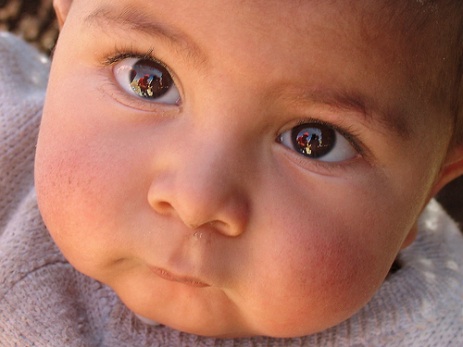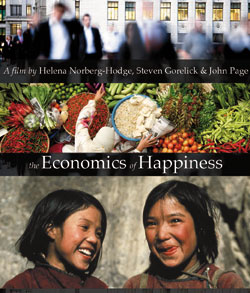 Money can’t make you happy, they say. Maybe a new kind of economy can?What if GDP stood for Great Domestic Pleasantness? How about an economy whose success is not determined by growth for growth’s sake? A new documentary, The Economics of Happiness, explores this rich territory.
Money can’t make you happy, they say. Maybe a new kind of economy can?What if GDP stood for Great Domestic Pleasantness? How about an economy whose success is not determined by growth for growth’s sake? A new documentary, The Economics of Happiness, explores this rich territory.
The film makes a connection between the economic crisis, the environment, and a “crisis of the human spirit” — the reality that even as our material wealth has increased, we have not gotten happier. According to a study cited by author and 350.org activist (and Grist Board member) Bill McKibben, people in the United States have actually become less happy since the 1950s.
Economics of Happiness makes a well-reasoned case that the “consumer culture” we’re living in has broken down community and our connection to nature. The film also takes a look at the negative impacts of corporate globalization, arguing that the process focuses on profits rather than people.
Ladakh, a region in northern India known as “Little Tibet,” serves as a case study in the ways globalization and industrialization are damaging cultures, livelihoods, and human connections. Once a place with zero unemployment, ample leisure time, natural resources, and a sense of general well-being, Ladakh has changed. The introduction of Western culture and values has created a sense of relative impoverishment. The introduction of subsidized food, fuel, and roads have all undermined the local economy.
So what’s the solution? The filmmakers, Helena Norberg-Hodge, Steven Gorelick, and John Page, focus on systemic economic transformation. They show examples of initiatives around the globe where people are “rebuilding more democratic, human scale, ecological and local economies — the foundation of an ‘economics of happiness’.”
Interviews with Bill McKibben, Vandana Shiva, Juliet Schor, and Samdhong Rinpoche — the prime minister of Tibet’s government in exile — make for a thought-provoking re-contextualization of globalization and the potential that lies in supporting local local banking, food production, and commerce.
It’s a comfort to watch a film that presents the sentiment that a future with less oil is preferable to a future with lots of oil.
Find where the film is screening near you or host a screening.
Check out the trailer here:



